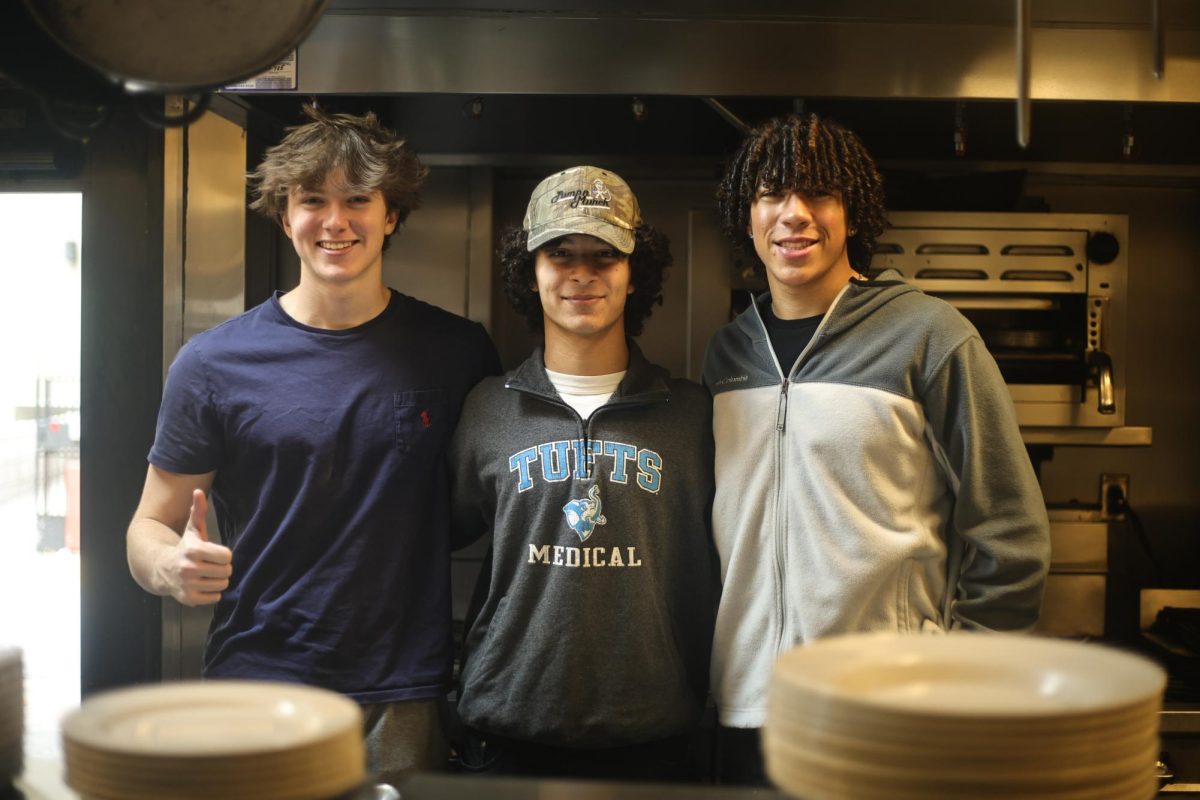With knives, cutting boards, and seasoning sauces hanging from every shelf, the student co-founders of Palo Alto Pantry stand in the middle of Saint Michael’s Alley kitchen, a local Palo Alto restaurant, preparing fresh ingredients for their meals.
With baby blue latex gloves boxes and shelves filled with fresh food, Milo Sabina, Oliver Chancellor, and Christian Saleh work to prepare hot meals every Monday for Bay Area residents who struggle with food and home insecurity in the Bay Area.
“We saw the change that needed to happen,” Chancellor said
Started by three juniors in Paly’s Social Justice Pathway, Christian Saleh, Milo Sabina and Oliver Chancellor, Palo Alto Pantry is a non-profit (501-c3) organization that advocates against food insecurity in the Bay Area by delivering nutritious meals to homeless shelters.
“What we do is different,” Saleh said “Instead of packaged food, we provide home-cooked meals from [someone] that really cares, which is something special,” Sabina said.
Sabina said the group’s defining feature is that it’s just them in the kitchen, meaning they get full access to all of the restaurant’s resources. With the help from Sabina’s dad, owner of Saint-Michael’s Alley, they have more flexibility with their meal preparation.
“Since it [St. Michael’s Alley] is closed on Mondays, we take that time to cook a large portion of the meals,” Sabina said.
Palo Alto Pantry is entirely youth-run. Every Monday, Sabina, Chancellor, and Saleh are out hand-delivering the meals, not only connecting to the homeless population on an individual basis but also showcasing an example of youth leadership.
“When [we] went to drop off the food, people were asking [us] who we were with or if we were doing this with a school. We had to say that we’re just doing it ourselves,” Chancellor said “I think that it makes them feel better knowing that somebody cares.”
Another defining factor that reflects Palo Alto Pantry’s mission is its adamancy in developing nutrition-based foods, as it tries to steer away from mass-produced canned foods — Chancellor said the lack of nutritious food available for locals living in food insecurity, and are forced to eat low-quality meals, continuing their cycle of food insecurity. According to the US’s Food and Nutrition Service, for Supplemental Nutrition Assistance Program (SNAP) participants, 61% of members’ biggest barrier to breaking free of hunger was the affordability of foods that are part of a healthy diet.
“It’s more than just food,” Chancellor said. “Foods produced in mass quantities are low quality, so it’s really about the process of a home-cooked special meal. They can’t get that sort of service from any other places.”
The co-founders say the effect of living in the Bay has on their organization and how Paly’s Social Justice Pathway community has supported their
efforts. Despite it not being a requirement for the class, students within their SJP cohort have been spreading the word and trying to help the organization gain traction.. Being located in the Bay Area gives the organization the grassroots to flourish and expand with innovators on every corner.
“In general being in Palo Alto is really helpful because of how active the city is around social justice and [there’s] a really strong activism community, which made us feel less alone,” Saleh said.
As rising seniors, Sabina, Chancellor, and Saleh hope that in the future, they can pass the baton of Palo Alto Pantry to a new group of eager students. Either at Saint Michael’s Alley or elsewhere, the co-founders hope that Palo Alto Pantry can live on through a new generation of activists.
“We really just hope that it continues on and doesn’t end when we graduate,” Saleh said.
As they continue their non-profit, Palo Alto Pantry’s ambition is to extend nutritious meals to those struggling with food poverty in the Bay Area and reach those who have been neglected.
“I mean, [there] no shortage of people that need food in the world,” Sabina said. “So we are ready to keep on continuing.”
